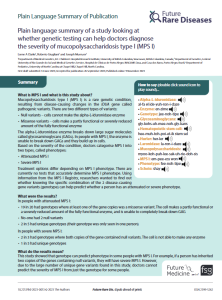Looking at whether genetic testing can help doctors diagnose the severity of MPS I- a plain language summary
 This Plain Language Summary of Publication article from Future Rare Disease discusses a rare genetic condition called mucopolysaccharidosis type I (MPS I). The summary describes a study where researchers wanted to find out whether knowing the specific combination of two disease-causing gene variants can help predict whether a person has an attenuated or severe phenotype.
This Plain Language Summary of Publication article from Future Rare Disease discusses a rare genetic condition called mucopolysaccharidosis type I (MPS I). The summary describes a study where researchers wanted to find out whether knowing the specific combination of two disease-causing gene variants can help predict whether a person has an attenuated or severe phenotype.
Visit the Future Medicine using the link to read the article.
The original article on which this summary is based is called ‘Genotype-phenotype relationships in mucopolysaccharidosis type I (MPS I): Insights from the International MPS I Registry’ and is published in Clinical Genetics.
Visit Wiley Online Library using the link to read the original article.
